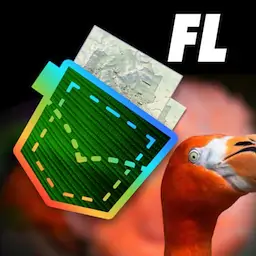Fort WilliamsHistory and Cultural Signs |
Fort Williams at St. Marks National Wildlife Refuge (NWR) in Florida. Published by the U.S. Fish & Wildlife Service (USFWS).
featured in
| Florida Pocket Maps |  |
Wakulla Beach: site of
Wakulla Beach Hotel and
West Goose Creek Seineyard
84°8.892' W
30° 7.797' N
30° 9.099' N
6
5
4
Mandalay: site of Aucilla River
St. Marks Lighthouse: site of
Lighthouse, Ft. Williams, and
Spanish Hole/Shipwreck
Mounds Station: site of
Shell Mounds and Naval Stores
83° 58.769' W
84° 10.955' W
84° 9.869' W
St. Marks National Wildlife Refuge History Trail
1
Plum Orchard: site of Port Leon
84°8.710' W
30° 6.316' N
2
East River: site of CCC and
Salt Works
84°15.703' W
3
GPS Coordinates:
84° 10.955' W ~ 30° 4.658' N
30° 6.985' N
30° 4.658' N
30° 5.282' N
Fort Williams, in a drawing from Frank Leslie’s
Illustrated Newpaper, February 22, 1862 (detail). (Courtesy State Archives of Florida)
watery woods
Before the Civil
and engaged
War, Florida was
Confederate
thinly populated
forces on March
with few cities of
6 at the Battle of
any size. St. Marks
Natural Bridge.
had been the
Their goal was to
fifth largest town
capture Tallahas
in Florida and a
see, but the Union
busy port. But in
troops withdrew
the decade before
after the battle.
the war shipping
Tallahassee
business shifted
remained the
to other towns.
only southern
The beginning
capital east of
of the conflict
This drawing shows the lighthouse, Ft. Williams and the three-masted U.S. gunboat Mohawk firing on the Confederate
the Mississippi
signaled a short
gunboat Spray. The Spray was a modern steam-powered side wheeled boat armed with three guns that carried
that was never
men
and
supplies
between
St.
Marks
and
the
lighthouse.
The
Spray
is
in
the
background,
between
the
fort
and
the
lived revival for the
lighthouse. (Courtesy State Archives of Florida)
captured by Union
port of St. Marks;
forces.
blockade
The exact location of Fort Williams
stockade to shelter the
runners easily slipped in and out
is unknown, but it is thought to be
soldiers who were guarding
until President Lincoln authorized
near the end of Cedar Point Trail.
the
salt
workers
and
the
a blockade of southern ports –
townspeople of St. Marks.
These items (not shown to scale) were
Musket
including St. Marks – on April 19,
recovered during an archeological dig
ball
On June 15, 1862, a
1861.
near the site of Fort Williams. They
shot
party of Union Marines
Shortly after the blockade began,
could have been left behind by Civil
landed near the lighthouse.
War soldiers or nearby residents.
the Confederates
(Artifact photos courtesy of the Florida
They
burned
the
barracks
and
the
built a fort near
Division of Historical Resources,
Handcut
keeper’s home. The fort was not
the St. Marks
Bureau of Archaeological Research)
button
rebuilt, but it had provided a sense of
Lighthouse
safety for a few months.
and named it
The St. Marks Refuge Association, Inc.,
On March 4, 1865, soldiers from
Ft. Williams in
with a matching grant from the National Fish
the 2nd and 99th U.S. Colored
and Wildlife Foundation, produced the signs
honor of Colonel
and brochures for the St. Marks National
Infantry landed
J.J. Williams,
Wildlife Refuge History Trail. The association
near the
a Tallahassee
is a 501(c)(3) organization that supports
lighthouse.
planter who led
educational, environmental, and biological
They slogged
the 2nd Florida
programs of St. Marks National Wildlife
Bristol Glazed
north
Refuge. Visit www.stmarksrefuge.org for more
Cavalry. The fort
Albany slipped
information.
9/2010
through the
was more of a
Glass bottle neck
whiskey jug sherd

